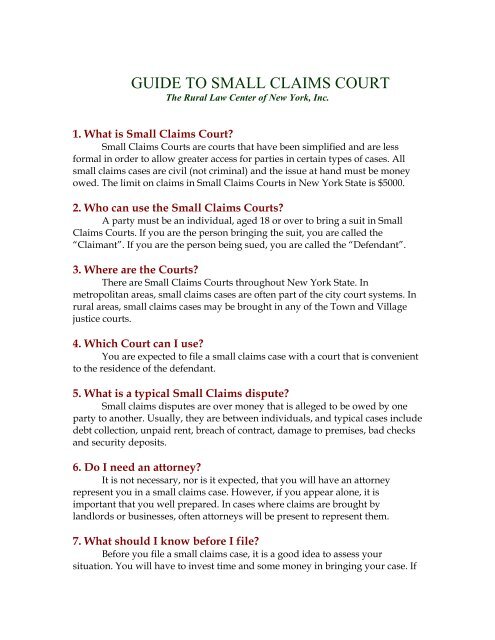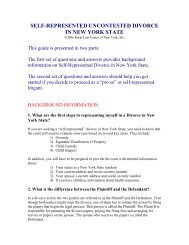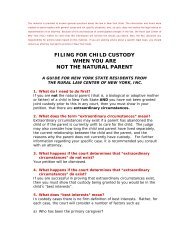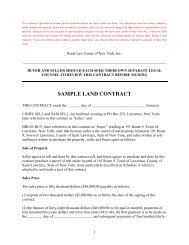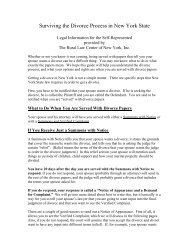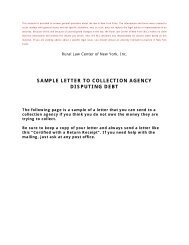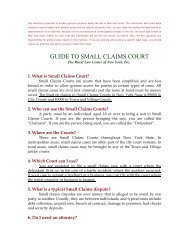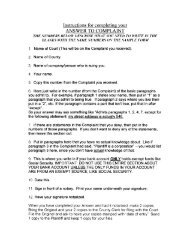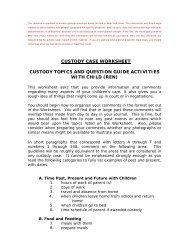GUIDE TO SMALL CLAIMS COURT - Rural Law Center of New York
GUIDE TO SMALL CLAIMS COURT - Rural Law Center of New York
GUIDE TO SMALL CLAIMS COURT - Rural Law Center of New York
You also want an ePaper? Increase the reach of your titles
YUMPU automatically turns print PDFs into web optimized ePapers that Google loves.
<strong>GUIDE</strong> <strong>TO</strong> <strong>SMALL</strong> <strong>CLAIMS</strong> <strong>COURT</strong>The <strong>Rural</strong> <strong>Law</strong> <strong>Center</strong> <strong>of</strong> <strong>New</strong> <strong>York</strong>, Inc.1. What is Small Claims Court?Small Claims Courts are courts that have been simplified and are lessformal in order to allow greater access for parties in certain types <strong>of</strong> cases. Allsmall claims cases are civil (not criminal) and the issue at hand must be moneyowed. The limit on claims in Small Claims Courts in <strong>New</strong> <strong>York</strong> State is $5000.2. Who can use the Small Claims Courts?A party must be an individual, aged 18 or over to bring a suit in SmallClaims Courts. If you are the person bringing the suit, you are called the“Claimant”. If you are the person being sued, you are called the “Defendant”.3. Where are the Courts?There are Small Claims Courts throughout <strong>New</strong> <strong>York</strong> State. Inmetropolitan areas, small claims cases are <strong>of</strong>ten part <strong>of</strong> the city court systems. Inrural areas, small claims cases may be brought in any <strong>of</strong> the Town and Villagejustice courts.4. Which Court can I use?You are expected to file a small claims case with a court that is convenientto the residence <strong>of</strong> the defendant.5. What is a typical Small Claims dispute?Small claims disputes are over money that is alleged to be owed by oneparty to another. Usually, they are between individuals, and typical cases includedebt collection, unpaid rent, breach <strong>of</strong> contract, damage to premises, bad checksand security deposits.6. Do I need an attorney?It is not necessary, nor is it expected, that you will have an attorneyrepresent you in a small claims case. However, if you appear alone, it isimportant that you well prepared. In cases where claims are brought bylandlords or businesses, <strong>of</strong>ten attorneys will be present to represent them.7. What should I know before I file?Before you file a small claims case, it is a good idea to assess yoursituation. You will have to invest time and some money in bringing your case. If
a counterclaim, you should be prepared to deal with that case, as well as yourown.12. Can my case be settled before I see the judge?Yes, in fact in most Small Claims Courts, the parties are encouraged toparticipate in dispute resolution services prior to their court appearance, byparticipating in mediation. These mediation services are made available to thecourts by the local Community Dispute Resolution <strong>Center</strong>s (CDRC’s). There is aCDRC in every county in <strong>New</strong> <strong>York</strong> State, and mediation services are providedto courts and communities by trained and certified mediators. Mediation hasproven to be extremely successful in small claims cases, since the process allowsboth parties to work out a satisfactory solution to their dispute.13. How does Mediation work?Mediation is an opportunity for the parties to meet with a neutral, thirdparty (the mediator) and attempt to reach a solution to the dispute that isacceptable to both parties. Participation in mediation is voluntary and mediationdiscussions remain confidential. This gives the parties an opportunity to discussthe case freely in the hopes <strong>of</strong> working things out. The judge does not participatein mediations, nor does the mediator provide the court with a report <strong>of</strong> thediscussion. If the mediation results in a signed agreement, only the actualagreement is provided to the court.14. Why would I want to mediate my case?Even if you think you have a strong case, there is no guarantee <strong>of</strong> how thejudge will rule. There may be evidence presented by the other party thatconvinces the judge to rule against you. And, when the judge rules, there isalways one winner and one loser. In mediations, generally the parties reach amutually acceptable compromise. This is certainly preferable to taking a chanceon the judge’s decision. A mediated settlement will give you at least a partialwin, as opposed to a possible complete loss.15. Is Mediation available in my Small Claims Court?You can ask the court clerk if mediation is a part <strong>of</strong> the small claimsprocess in that particular court. If it is not, you can contact your local CDRC andsee if arrangements for a mediation session can be made prior to your court date.Mediation <strong>Center</strong>s are listed by county on the NYS Unified Court System websiteat the Alternative Dispute Resolution pages. The web address iswww.courts.state.ny.us/ip/adr/index.shtml.


